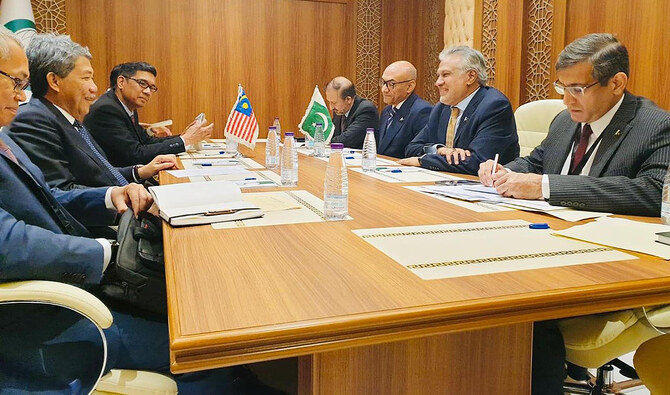ISLAMABAD: Pakistan’s Foreign Minister Ishaq Dar discussed the humanitarian crisis in Gaza with his Malaysian counterpart and expressed steadfast support for the Palestinian cause on Monday, the foreign office said in a statement, amid calls by US President Donald Trump to relocate people from Gaza to Egypt and Jordan.
Dar previously spoke to the foreign ministers of Iran and Egypt on Sunday to drum up support for Palestinians in Gaza. His interactions come after last week’s comments by Trump in which he floated the idea of US administration over Gaza, envisioning rebuilding the devastated territory into the “Riviera of the Middle East” after resettling Palestinians elsewhere, namely Egypt and Jordan.
The remarks have prompted global backlash, mostly from Arab countries who have firmly rejected the proposal and insisted on a two-state solution with an independent Palestinian state alongside Israel.
Dar spoke to Malaysian Foreign Minister Dato’ Seri Utama Hajji Mohamad bin Hajji Hasan over the phone to discuss the humanitarian crisis in Gaza and the overall situation of the Middle East region, the foreign office said.
“The Deputy Prime Minister/Foreign Minister expressed Pakistan’s steadfast support for the Palestinian people and their just cause,” the statement said. “He also conveyed Pakistan’s support for the convening of an Extraordinary OIC meeting of the Council of Foreign Ministers to discuss this urgent issue.”
The development also takes place ahead of Egypt hosting a summit of Arab nations on Feb. 27 to discuss “the latest serious developments” concerning Palestinian territories, its foreign ministry said on Sunday.
Aid trucks have flooded into Gaza after an uneasy ceasefire between Hamas and Israel began on Jan. 19, raising hopes that the war that led to seismic shifts in the Middle East may be headed toward an end. The truce, however, is fragile.
Israel has said it won’t agree to a complete withdrawal from Gaza until Hamas’ military and political capabilities are eliminated. Hamas says it won’t hand over the last hostages until Israel removes all troops from the territory.
During the 42-day first phase of the ceasefire, Hamas is gradually releasing 33 Israeli hostages captured during its Oct. 7, 2023, attack that sparked the war in exchange for the release of nearly 2,000 Palestinian prisoners and a flood of humanitarian aid to Gaza. The deal also stipulates that Israeli troops will pull back from populated areas.
In the second phase, all remaining living hostages would be released in return for a complete Israeli withdrawal from Gaza and “sustainable calm.”












